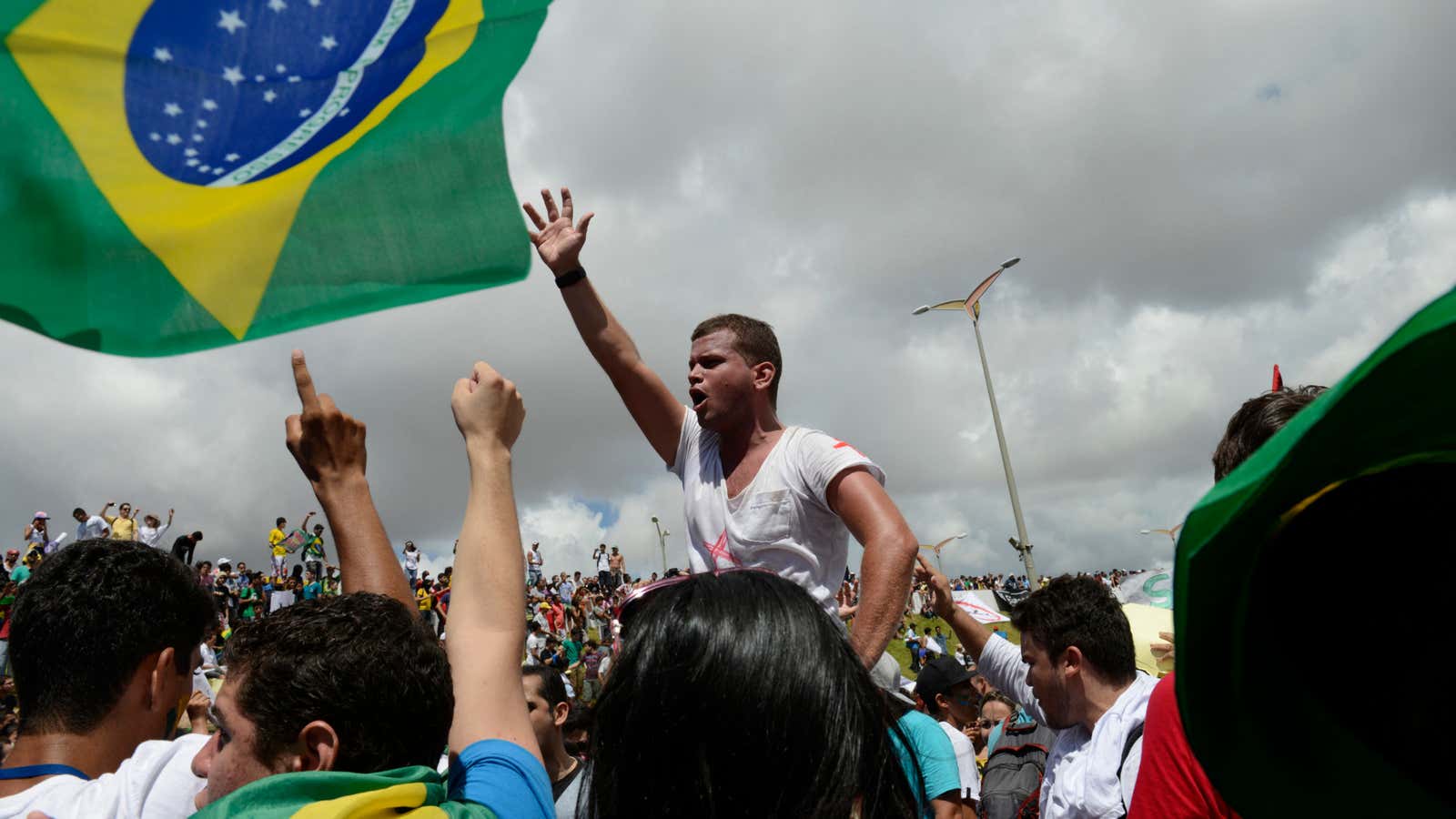Rio de Janeiro, Brazil—“The giant awakened’’ was a loud chant by over one million protesters who took to the streets of Brazil’s biggest cities last night. They demanded everything from imprisoning corrupt politicians to better education and hospitals, to the cancellation of the 2014 World Cup because of lavish spending on stadiums. What began on June 6 as a small demonstration against an increase of 20 centavos in Sao Paulo’s municipal bus fare mushroomed into the largest wave of protests Brazil has seen in 21 years.
At the core of this awakened giant are Brazil’s new taxpayers. They are the 40 million citizens who joined the formal economy over the past 10 years and now realized they are getting underdeveloped services in return for the rich-nation taxes they pay.
Most of the diffuse grievances in the leaderless, social media-organized uprising boil down to frustration over how taxpayers’ money is spent. Over the past decade 40 million Brazilians rose from poverty into the new middle class, gaining access to the formal job market, and paying social security taxes and other duties. Nearly nine million Brazilians started to pay income tax as individuals since 2003, and most Brazilians spend at least 40% of their gross earnings paying duties, including sales and services taxes. Taking into account all taxes, Brazilians paid 36% of GDP in taxes, or R$1.6 trillion ($730 billion) in 2012, and R$1.5 trillion in 2011. (By comparison, Americans pay 25.1% of GDP in taxes, the Swiss pay 28.5%, and the French pay 44.2%, according to the OECD.)
It shouldn’t come as a surprise that the protests are happening now. Brazil is getting worldwide attention with the soccer Confederations Cup, a sort of dress rehearsal for next year’s FIFA World Cup. With all the hype surrounding the stadiums, Brazilians began to question why the country is spending R$33 billion ($15 billion) on soccer-related infrastructure, $7 billion on stadiums alone. That’s three times what South Africa spent in 2010. Meanwhile, public hospitals are precarious, and inefficient public schools place Brazilian teenagers near the bottom of global rankings in reading and mathematics. “We want FIFA-standard schools and hospitals” and “Japan, let’s trade our soccer for your schools” were popular messages on thousands of banners at last night’s demonstration in Rio, which attracted 300,000 people.
And after five years of strong growth, the new middle class is getting crushed by rising inflation and soaring debt. The jobless rate, which dropped to a historic, near full-employment level of 4.6% in December, rose to 5.8% in April. The economy is slowing and inflation has accelerated to well above the government target. The cost of living is rising all around.
The movements have no political leadership. Protesters in Sao Paulo burned political party and union flags, decisively rejecting political affiliation for their protests. President Dilma Rousseff is dismayed. She canceled a state visit to Japan and called all her ministers to an emergency meeting in Brasilia today. Her reelection next year—viewed as certain just over a month ago—is now a big question mark.
Brazilians don’t have a history of protesting and fighting for their rights, even if they join Carnival parties by the millions during the annual festival. The last wave of protests was in 1992, when groups of mostly students marched with their faces painted in yellow and green to demand the impeachment of a president on corruption charges. But two decades is enough time for a generation of Brazilians to realize their hard-earned money is not bringing them the benefits they believe they deserve. Brazilians are starting to think as taxpayers.
